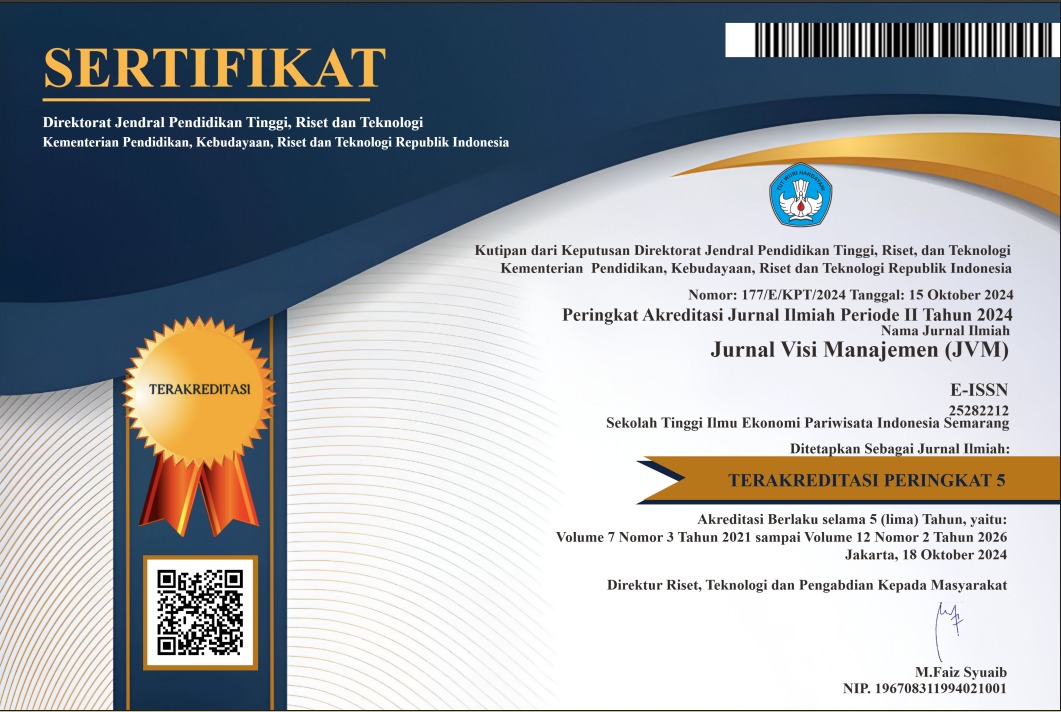Analisis Potensi dan Strategi Pengembangan Ekowisata Arung Jeram Sungai Asahan Berbasis ECOS dan Keberlanjutan Sosial-Ekonomi
DOI:
https://doi.org/10.56910/jvm.v10i3.485Keywords:
rafting, ecotourism, socio-economic, strategy, Asahan-RiverAbstract
The Asahan River in North Sumatra holds significant potential as an ecotourism destination for whitewater rafting, featuring Class IV-V+ rapids that attract both domestic and international tourists. This study aims to analyze the potential and development strategies for ecotourism in the Asahan River using the Ecotourism Opportunity Spectrum (ECOS) approach with the addition of a socio-economic sustainability variable. This approach evaluates seven key components: accessibility, attractions, infrastructure, social interaction, skill and knowledge levels, related resources, and visitor impact. Data were collected through observation, interviews, questionnaires, and documentation, and analyzed using a descriptive qualitative method. The results indicate that the Asahan River is classified as an Eco Specialist, with high natural appeal but requiring improvements in accessibility and community participation. Socio-economic sustainability assessments reveal that economic benefits are not evenly distributed, and local community involvement in tourism management remains low. Proposed strategies include improving infrastructure, training local communities, digital promotion, and strengthening stakeholder collaboration to establish a sustainable tourism destination.
References
Ayhan, E. (2016). Ecotourism planning and development: A study on ecotourism potential in Canakkale. Journal of Tourism Research, 12(3), 45-60.https://doi.org/10.1016/j.jtr.2016.05.001
Boyd, S. W., & Butler, R. W. (1996). Managing ecotourism: An opportunity spectrum approach. Tourism Management, 17(8),557-566.https://doi.org/10.1016/j.tourman.1996.12.005
Damanik, J., & Weber, H. F. (2019). Perencanaan ekowisata: Dari teori ke aplikasi.Yogyakarta: Andi.
Fernie, K. (1993). Ecotourism classifications and their relevance to sustainable development.Sustainable Tourism Review, 4(1), 12-18. https://doi.org/10.1177/sustour.2018.004
Fitriana, L., Santoso, A., & Nugroho, Y. (2018). Community-based tourism: Increasing community participation in sustainable tourism development. International Journal of Ecotourism and Tourism Studies, 5(2), 22-33. https://doi.org/10.1037/eco2018.002
Maulana, F., Puspitasari, D., & Kusuma, A. (2017). The role of community participation in managing ecotourism: A case study in East Java. Journal of Sustainable Tourism Development, 21(4), 234-245. https://doi.org/10.1080/21568316.2017.154234
Putra, I. N. (2021). Integrating the Ecotourism Opportunity Spectrum (ECOS) and community- based approaches: Lessons from Bali. Journal of Tourism and Environment Studies, 15(1), 101-119. https://doi.org/10.1080/22312345.2021.153219
Rachman, A. (2018). Evaluating ecotourism potentials using the ECOS framework: Case studies in Southeast Asia. Asian Journal of Ecotourism, 9(3), 87-110. https://doi.org/10.1177/asej.2018.098
Spillane, J. (2019). Ekonomi pariwisata: Sejarah dan pengembangan. Jakarta: Gramedia.
Tamelan, T., & Harijono, R. (2019). Principles and practices of sustainable ecotourism. Journal of Ecotourism Studies, 7(2), 34-56. https://doi.org/10.1080/21568316.2019.157842
Way, Y., Wusiang, S., & Supardjo, B. (2020). Accessibility and its impacts on tourism satisfaction: A study in rural tourism destinations. International Journal of Tourism Research, 22(4), 412-426. https://doi.org/10.1002/jtr.2357
Wilson, M., & Laarman, G. (2019). Ecotourism trends and frameworks: A global perspective.Tourism and Environment Review, 18(3), 102-118. https://doi.org/10.1016/ter.2019.08.005
Yoeti, O. (2020). Pariwisata berkelanjutan: Pendekatan konseptual dan praktis. Bandung: Alfabeta.
Yulianda, F. (2019). Evaluating natural resources suitability for ecotourism using RZI (Recreation Zone Index). Journal of Natural Resources and Environment, 8(2), 113-128. https://doi.org/10.2169/nrenv.2019.008
Ziffer, K. (1989). Ecotourism development guidelines for planning and management.Ecotourism Review, 3(1), 8-23. https://doi.org/10.1016/ecotr.1989.003







